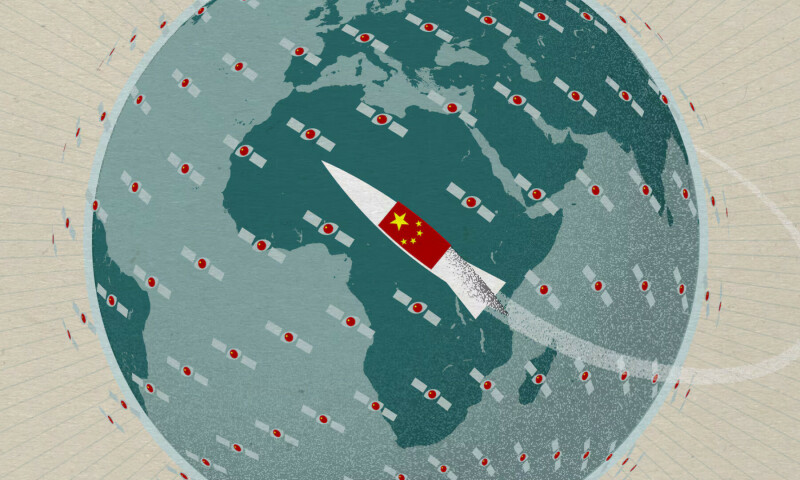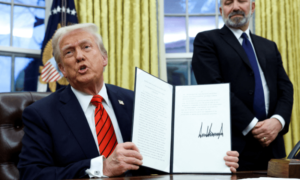Washington’s efforts at space diplomacy unable to counter China’s growing bonds in Africa, which are gaining significance as a new global space race takes off.
On the outskirts of Cairo, a cutting-edge space lab was supposed to be the first in Africa to produce homegrown satellites. Step inside the plant, though, and the made-in-Africa image begins to fade
Satellite equipment and parts arrive in crates from Beijing. Chinese scientists scan space-tracking monitors and deliver instructions to Egyptian engineers. A Chinese flag hangs from one wall. The first satellite assembled at the factory hailed as the first ever made by an African nation, was built mainly in China and launched from a spaceport there in December 2023.
The Egyptian satellite lab is the latest advancement in China’s secretive overseas space program. Beijing is building space alliances in Africa to enhance its global surveillance network and advance its bid to become the world’s dominant space power, Reuters has learned.
China has publicly announced much of this space assistance to African countries, including its donations of satellites, space monitoring telescopes and ground stations. What it hasn’t discussed openly, and which Reuters is reporting for the first time, is that Beijing has access to data and images collected from this space technology and that Chinese personnel maintain a long-term presence in facilities it builds in Africa.
The satellite plant, which began operating in 2023, is part of a suite of space technology that China has gifted to Egypt over the past two years. Transfers that have been disclosed publicly include a new space monitoring centre, which features two of the world’s most powerful telescopes, plus two Earth observation satellites launched in 2023 – the one that was assembled in Egypt, and another manufactured solely in China.
In addition, China that year launched a third, Chinese-made satellite for Egypt, one capable of military-grade surveillance, according to two people with knowledge of the matter.
The satellite facility is the centrepiece of Space City, a complex being constructed about 30 kilometres east of Cairo near a new administrative capital being built by Egyptian President Abdel Fattah El-Sisi’s government.
Sisi has fostered closer ties with China in recent years, including inking infrastructure and energy projects under President Xi Jinping’s Belt and Road Initiative.
The Egyptian presidency did not respond to a request for comment.
Egypt, a major recipient of US military aid, is not the only country in Africa being drawn into China’s orbit. Beijing has 23 bilateral space partnerships in Africa, including funding for satellites and ground stations to collect satellite imagery and data, according to the United States Institute of Peace, an American think tank.
In the past year, Egypt, South Africa and Senegal agreed to collaborate with China on a future moon base, a project that rivals the United States’ own lunar plans.
This is just the beginning. In a meeting with dozens of African leaders in Beijing in September, Xi said satellites, as well as lunar and deep-space exploration, would be among the priorities for $50 billion in Chinese loans and investment earmarked for Africa over the next three years. Xi’s administration says publicly it is helping boost African space programs because China wants no country left behind as economies and militaries become increasingly reliant on space technology.
Privately, China is getting far more in return for its investment. This includes access to surveillance data collected by satellites and telescopes as well as a permanent presence in facilities it builds, according to six people with direct knowledge of China’s space projects in Africa.
As China advances its relationships in Africa with technology incentives, the United States is pulling back. Billionaire Elon Musk, CEO of SpaceX and Tesla, is heading US President Donald Trump’s drive to shrink the federal government. One of his first targets has been the US Agency for International Development, the aid agency that has spread American soft power around the world since its establishment by President John F Kennedy in 1961.
The Pentagon says China’s space projects in Africa and other parts of the developing world are a security risk because Beijing can hoover up sensitive data, enhance its military capabilities and coerce governments if they become locked into China’s communications ecosystem.
The Pentagon and Eftimiades did not provide specific evidence that China has used space technology it has donated to Africa for intelligence or military purposes, and Reuters was unable to independently verify these claims.
Liu Pengyu, spokesman for the Chinese Embassy in Washington, did not respond directly to questions about whether China is using equipment in Africa for surveillance. He said the US “is not in a position to smear or defame China” because of America’s own record of spying.
“The US is the world’s largest surveillance state,” Liu said.
The space infrastructure and equipment that China is installing in Africa have common civilian uses such as transmitting data, monitoring the impact of climate change and helping fly spacecraft. But they also have military applications.
Powerful telescopes are used for space situational awareness. They could predict when US military satellites pass overhead and help coordinate the use of anti-satellite weapons (ASAT), according to a 2022 report by the US Defense Intelligence Agency.
During a conflict, for instance, if China invaded democratically ruled Taiwan, knocking out an enemy’s satellites could disrupt missile guidance systems and tangle communications between ground, air and naval troops.
China and Russia have previously tested ASATs and are continuing to develop more advanced versions, the DIA report said.
Access to a broad range of Chinese-built, foreign-owned satellites gives Beijing the ability to better coordinate military operations. These satellites could also give China a clearer picture of US military activities around the world. The Earth observation satellite assembled in Egypt, for instance, has the ability to take high-resolution images of areas where the US and Egypt carry out joint military exercises.
China’s overseas ground stations, like one it has built in Ethiopia and another it is planning with Namibia, can be used for coordinating military operations, tracking missile launches and monitoring other countries’ space assets. They also add to a sprawling global network of data collection infrastructure, which includes undersea internet cables and 5G networks.
US allies have pulled back from terrestrial space partnerships with China. In 2020, Sweden declined to renew a contract with China that had allowed Beijing to use satellite ground stations in Sweden and Australia, citing the “geopolitical situation.”
Sweden’s state-owned space company declined to comment further on the contract. Australia’s defence department did not respond to a request for comment.
To understand China’s space push in Africa, Reuters interviewed more than 30 people with knowledge of Chinese projects on the continent, including diplomats, space engineers, consultants, and military and intelligence officials. Reuters also reviewed over 100 patents and papers published by the Chinese government and military bodies leading Beijing’s space program.
China’s space web
China’s rapid expansion of its space infrastructure on Earth is an example of a broader trend in which Beijing is catching up with the US on everything from satellites to uncrewed moon landings to anti-satellite weapons, Stephen Whiting, commander of the Pentagon’s US Space Command, told Reuters.
China has accelerated the launch of low-earth-orbit communications satellites over the last two years in an effort to compete with Musk’s Starlink. The mogul’s rocket launch company SpaceX owns Starlink, which provides commercial internet service, but is also building a network of hundreds of spy satellites for the National Reconnaissance Office, a US intelligence agency that manages spy satellites.
“We see breathtaking advancements by China in space,” Whiting said, adding that the Pentagon is “paying attention” to Beijing’s partnerships with developing countries.
China Aerospace Science and Technology Corporation (CASC), a state-owned military and space contractor, has announced a goal to make the country the world’s top space power by 2045. Plans include sending astronauts to the moon by 2030, building a moon base and developing nuclear-powered space shuttles.
The US still has by far the biggest space program in the world, which is underpinned by SpaceX and a host of other private space companies.
China’s space investments overseas also haven’t always gone to plan. For instance, when a Chinese rocket carrying an Indonesian satellite exploded in 2020, it allowed SpaceX to swoop in and entrench itself as the Southeast Asian country’s primary space contractor, Reuters reported.
Still, China’s advances in space pose a challenge to Trump. During his first term, Trump created the US Space Force, a new arm of the military that recognised the importance that space will play in future conflicts.
Trump’s space team is unlikely to prioritise forging bilateral space relationships in the way Beijing has done in Africa, according to three space policy veterans who advised the former president’s transition team.
They predict Trump is more likely to double down on America’s military capacity in space and push ahead with a race to the moon and possibly Mars, bolstered by his friendship with Musk.
NASA’s Artemis program, supported by rocket launches by private companies like SpaceX, aims to get astronauts back on the moon by 2028. NASA, in partnership with the United Arab Emirates, Canada, Japan and the European Space Agency, also plans to build a space station in the moon’s orbit known as the Lunar Gateway.
The White House did not respond to a request for comment.
Washington’s efforts at space diplomacy have been unable to counter China’s growing bonds in Africa, which are gaining significance as a new global space race takes off, according to interviews with US and African space officials.
Around 90 countries now have space programs of their own, with many smaller nations aligning their national policies around frameworks set out by Washington or Beijing. By helping developing countries build space industries, China is nurturing crucial alliances.
The moon has emerged as a test of allegiance. The US has signed up more than 50 countries to the Artemis Accords, a set of rules to influence space exploration and the use of the moon and Mars. China has described the US rule book as a colonial-style land grab, proposing instead to build a collaborative International Lunar Research Station. China has gained the support of a dozen countries for its moon base, including Russia and Egypt.
Scott Pace, head of the National Space Council in the first Trump administration, described China as a fundamentally “self-interested actor” whose partnerships aim to cement China as the “centre of power” in space.
China’s main space agency, the China National Space Administration (CNSA), did not respond to a request for comment. In response to a question from a Reuters reporter at a media briefing in Beijing in October, Yang Xiaoyu, director of the agency’s System Engineering Department, said China has data-sharing agreements with partner countries but “has never, and will never” use images and data to enhance its military surveillance capabilities.
Liu, the Chinese Embassy spokesman, said “African countries and their people have the wisdom and ability to choose partners that align with their own interests.”
US Missteps
In many ways, China’s space diplomacy mirrors a strategy the US has been implementing for decades. NASA, the US Space Force and US private companies maintain networks of global ground stations for tracking and communicating with satellites, mostly hosted in US overseas territories or allied countries. These sites are used for monitoring space and downloading data – and for conducting secretive military operations in space.
Space Command’s Whiting said the US programs aren’t comparable to China’s.
“We publicly talk about where they are, what they do,” Whiting said of US military ground stations. “With China, we don’t see that same level of openness, and that does create doubt as to what’s happening.”
Whiting said the US Space Command does not have any space-tracking assets in countries where China is setting up similar capabilities.
China’s expanding space presence in Africa stands in sharp relief to America’s absence. NASA last year began construction on a ground station in South Africa — its first on the continent — to communicate with spacecraft in the US moon program. Its partnerships consist mainly of a network of 36 shoebox-sized atmospheric sensors scattered across 14 African countries, according to NASA international agreements reviewed by Reuters.
It has also enlisted three African countries — Angola, Nigeria and Rwanda — to the Artemis Accords.
Some African governments have grown weary of Washington’s security warnings about China and are more interested in which country is going to provide money and space technology, said Temidayo Oniosun, managing director at Space in Africa, a Nigeria-based consultancy.
“The US had decades to help Africa develop their space programs, but they never did,” Oniosun said. “These countries are realising that the US doesn’t exactly have their best interests at heart.”
Pace, the former top space official under Trump, said the US should have done more to build relationships in Africa and elsewhere. A big part of the problem is that NASA, the State Department and the US development agencies often don’t coordinate their efforts as closely as Chinese arms of government do, he said.
The State Department and NASA did not respond to requests for comment.
China’s more coordinated approach was demonstrated in the way it embedded itself inside Egypt’s space program from the start, according to interviews with five people involved in the projects.
Space City
In 2017, CNSA, the Chinese space agency, announced a partnership with Egypt’s National Authority for Remote Sensing and Space Sciences to build a satellite facility in Cairo. The Chinese deal coincided with Cairo’s creating the Egyptian Space Agency (EgSA) in January 2018 and laying out plans for the construction of a Space City on the outskirts of Cairo.
Between November 2017 and January 2018, Egyptian technicians and engineers went for training in China at space and military sites, two people with direct knowledge of the collaboration told Reuters.
When ground broke on the satellite plant, the Chinese ambassador to Egypt, Liao Liqiang, was on site. Liao, a career diplomat and vocal advocate for more Chinese-led space projects in Africa and the Middle East, would go on to closely oversee the development of the lab, according to the two people.
Dozens of construction workers and engineers from CASC, the Chinese space firm, moved into the Space City site. Some have never left.
The project was seen as a priority for China’s space agency, and progress on it was fed back to CASC President Zhang Zhongyang, two sources said. CASC develops space tech to support China’s military capabilities, according to a Reuters review of patents. This includes using satellites to coordinate missile strikes.
Zhang is a pivotal figure in China’s space and military firmament. His background in missile design has made him a valuable player in efforts by the People’s Liberation Army (PLA) to build up its space capabilities, according to statements posted on the official website of China’s State Council. Zhang’s role is highlighted by his membership in the military’s Science and Technology Committee, a key part of the PLA’s efforts to upgrade its technology and maintain war readiness. His high status in the Communist Party hierarchy is underscored by his inclusion in one of Xi’s top decision-making bodies, the Central Committee.
In July last year, Zhang visited Egypt to inspect the satellite facility, official photos show.
CASC, Zhang and Liao did not respond to requests for comment.
Egypt’s satellite facility does not, however, add up to a full-fledged space program — it relies on China for almost every aspect of the project. Two of the three satellites emanating from the partnership so far were built solely in China, while the third was assembled in Egypt from Chinese components. All three were launched from China.
The first, dubbed Horus 1, was put into orbit in February 2023. That Earth observation satellite can help Egypt monitor agriculture productivity, predict natural disasters, and spot criminal activity such as narcotics cultivation, EgSA said at the time.
The second, Horus 2, was launched weeks later from the same spaceport in China, CASC announced, without disclosing the customer. Horus 2 is a military-grade surveillance satellite built for Egypt, two sources with knowledge of the satellite said. EgSA did not respond to questions about the purpose of Horus 2.
Egypt’s third satellite, MisrSat-2, went aloft in December 2023. It was the first to come out of the Cairo plant.
Most of the construction of MisrSat-2 was done by CASC in China; parts were shipped to Cairo, assembled and tested by CASC and Egyptian engineers, then shipped back to China for launch, two people with direct knowledge told Reuters. While the $72 million satellite technically belongs to Egypt, CASC still monitors the data and images it collects, the people said.
Sherif Sedky, CEO of EgSA, told Reuters that the assembly facility and MisrSat-2 were “donations” from China and nothing was expected in return. Sedky said data from Egypt’s satellites belongs to and is controlled by Cairo.
EgSA did not respond to questions about whether China also has access to the satellite data.
MisrSat-2 will help Egypt tackle climate change, enhance farming output and improve urban planning, EgSA says.
Sedky said Egypt is not picking sides in the space race by partnering with China. Cairo has received more than $80 billion in US military and economic assistance since the late 1970s, according to the State Department website.
“We are neutral, we deal with everybody,” Sedky said in an interview in his office in Egypt’s Space City, a gated complex that also hosts a new African Space Agency created by the African Union. “If we get an offer, we take it.”
A Reuters journalist saw Chinese engineers buzzing in and out of the Space City complex. Asked about their presence, Sedky said they were there to install equipment and train Egyptian staff. He said these Chinese workers would leave eventually.
Egypt’s satellite plant may soon have a new tenant with Chinese connections. In August, USPACE Technology Group, a Hong Kong-listed private space tech firm, said it had signed a strategic partnership with EgSA to develop satellite technology at Egypt’s Space City.
USPACE did not respond to requests for comment.
Telescopes too
China and Egypt are also collaborating on a project to monitor satellites in orbit using sophisticated telescopes. That’s a capability military analysts say is crucial as the number of satellites in space multiplies – along with the development of weapons to cripple them.
Two optical telescopes were recently erected on the roof of a hilltop research station outside Cairo. Workers from the National Astronomical Observatories of China helped.
Makram Ibrahim, professor of space physics at Egypt’s National Research Institute of Astronomy and Geophysics, said the collaboration with China was for scientific research.
“There could be political motives, and you can do that analysis yourself on how they benefit politically,” Ibrahim told Reuters. “Secondly, they benefit scientifically because the data I get here, we both use it.”
Liu, the Chinese embassy spokesman, did not comment on China’s specific motives for investing in Egypt’s space program. He said, “Supporting Africa’s development is a shared responsibility of the international community.”
Ethiopia is another recipient of space aid from Beijing. Since 2019, China has launched two Earth observation satellites for the East African country and funded the construction of a ground station there. China also funds data collection to help Ethiopia monitor floods and droughts, said the country’s top space official, Abdissa Yilma, the general director of the Ethiopian Space Science and Geospatial Institute.
He said his nation is neutral and wouldn’t get drawn into the US-China rivalry. But he said the contest could help supercharge technological development, just as East-West competition did in the Cold War.
“It seems that the race has started again,” Yilma said.
Illustration showing a Chinese rocket and satellites. — Reuters
- Desk Reporthttps://foresightmags.com/author/admin/











